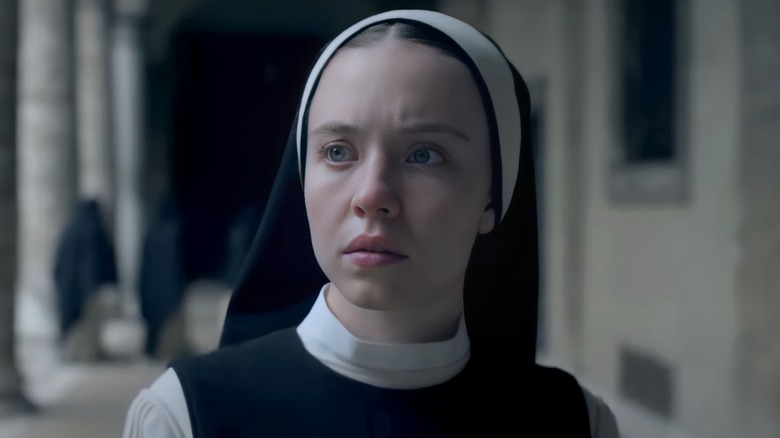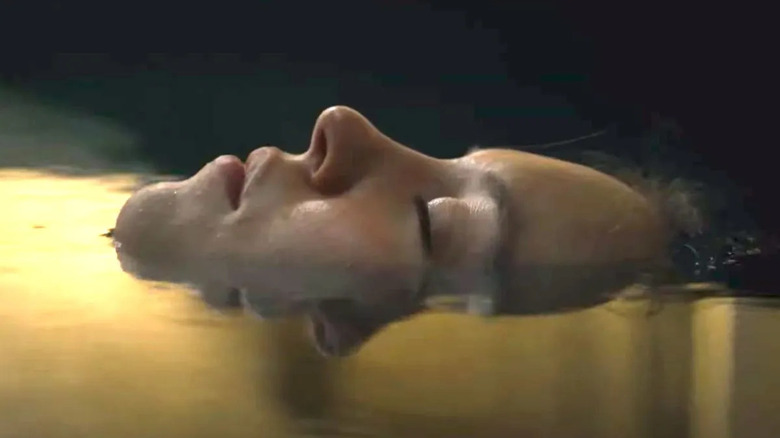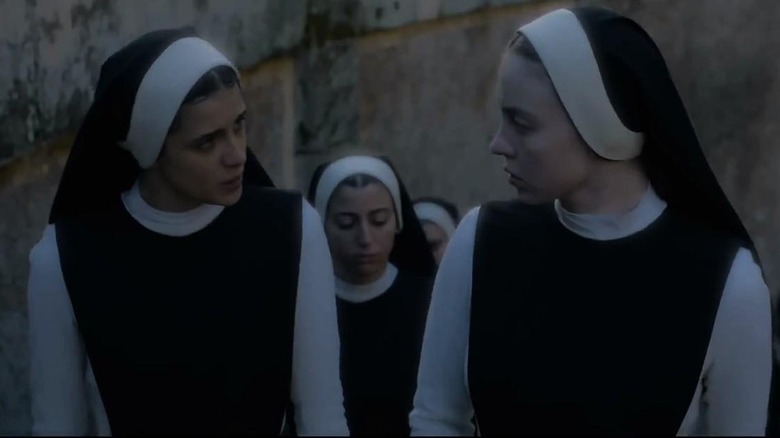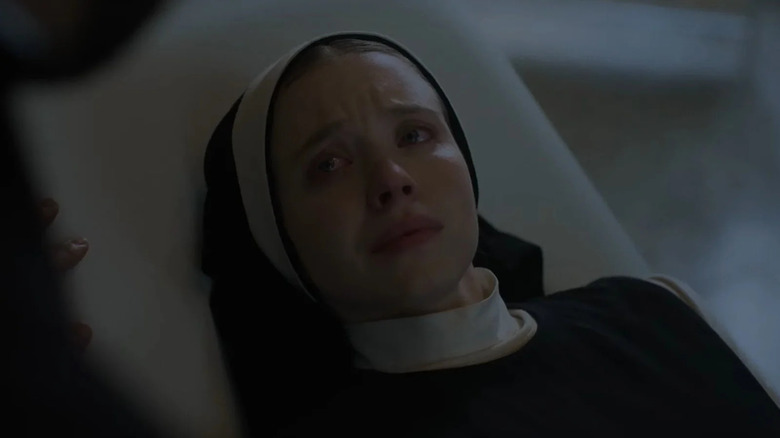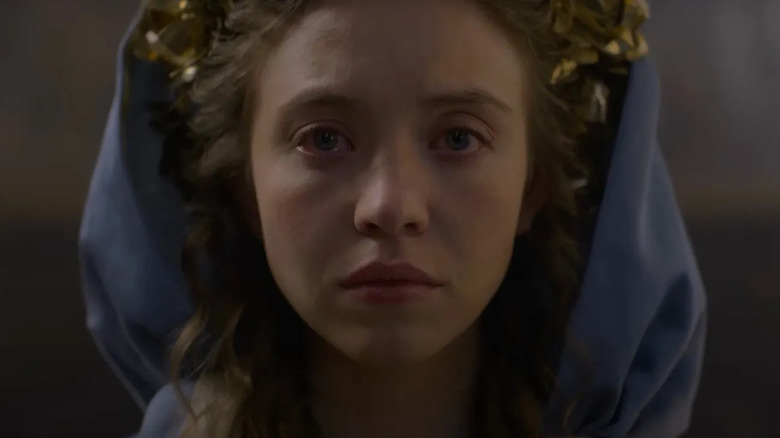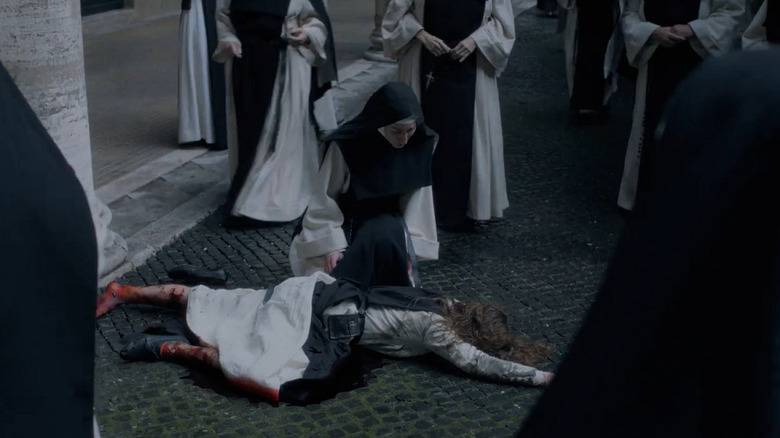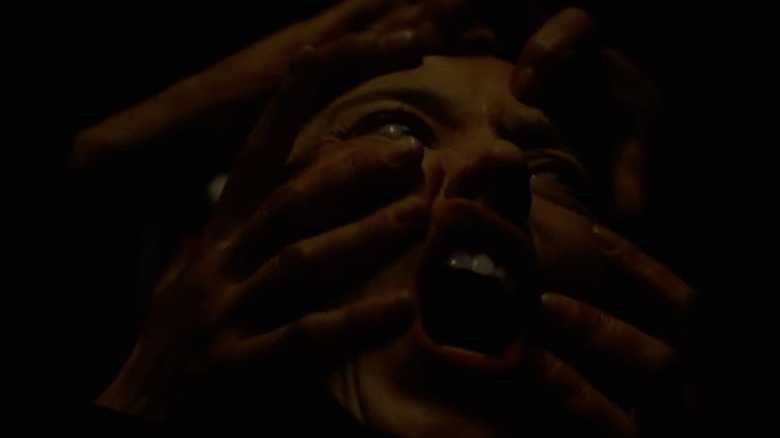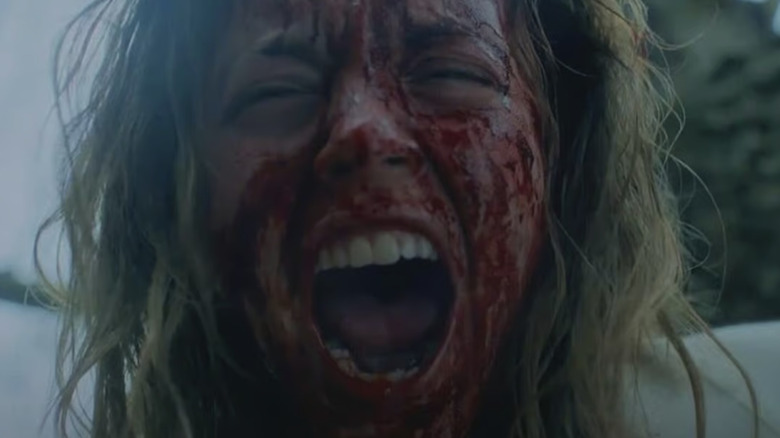Immaculate Ending Explained: Rock-A-Bye, Baby
This article contains major spoilers for "Immaculate."
To say that modern human society has issues with organized religion is an understatement. Make no mistake: faith is a beautiful and often necessary component of living, if only to help ease the burdens that are foisted upon every one of us on a daily basis. There can be such great comfort in believing that there's a divine presence in the universe, whether it's something that makes everything happen for an unfathomable reason or whether it's something that is perhaps testing us, putting all of us through our moral paces before we perhaps receive peace in the afterlife.
However, there's no denying that these beautiful and healthy aspects of religion have been woefully corrupted by eons of human weakness, frailty, bigotry, misogyny, and much else. As many people these days rightfully point out, a number of the current tenets of American Catholicism and Christianity (especially those of the Fundamentalist variety) are miles away from the actual teachings and principles of Jesus Christ.
"Immaculate," the new horror film by director Michael Mohan and writer Andrew Lobel, seeks to address this disparity within modern religion, specifically Catholicism, especially the way it does people more harm than good the more fanatical it becomes. Horror fiction has long had close ties to religion, after all, whether it be Old Testament Bible stories themselves or transgressive subversions of religions ideals and iconography. Rather than merely using the subgenre of Nunsploitation to make a generic horror movie, Mohan and company make "Immaculate" a compelling and impressively thoughtful (though still transgressive and subversive) statement on the disparity between religious dogma and human morality, particularly regarding the issue of women and their bodily autonomy.
The vanishing nun
The specter of the Virgin Mary haunts "Immaculate" right from the first moments, when a young nun named Sister Mary (Simona Tabasco) is reciting the "Hail Mary" prayer in Italian. After checking on a message scrawled on the wall of her room behind a portrait of the Virgin Mary — a message that perhaps she's left there — she sneaks into an older nun's room and very carefully swipes a set of keys from the woman's drawer.
Sneaking out of the convent under the cover of night, Sister Mary runs to the front gate of the building, at which point she pulls out the keys she'd stolen in order to try and free herself from the place. As she's fumbling for the right key, a group of sinister-looking nuns begin to emerge and converge on her position. These nuns have an aggressive and unsettling look, their faces covered with bright red masks, indicating that, if nothing else, they mean business.
Sister Mary nearly gets away, moving through the gate and trying to close it behind her, when one of the nuns grabs hold of her leg, breaking it as the two struggle. Sadly, mutilation is only the beginning of the horrible fate in store for Sister Mary, as she shortly awakens, still alive, on the inside of a coffin. It seems that this mysterious sect of sisters are imposing a vow of silence about what's going on at the convent on Sister Mary by any means necessary: she can distinctly hear people milling around outside of her tomb, but no one will assist or answer her desperate pleas for help. In effect, she is a woman whose voice and autonomy has been forcibly taken away by this religious sect.
Story of a cloistered nun
Not long after poor Sister Mary's screams have died out, the young prospective nun, Sister Cecilia (Sydney Sweeney) arrives in Italy. An encounter with a pair of male customs agents reveals several things about her: for one, she's a very naive and trusting Midwestern American girl, a woman who's previously only lived just outside of Detroit, Michigan and thus barely speaks any foreign language, let alone Italian. For another, she's fervently devoted to her holy calling: when one of the customs agents eyes her lasciviously, observing that she's very young (and, by implication, attractive) to choose to induct herself into the Sisterhood, she claps back by explaining that she doesn't see her path as a choice.
After being driven deep into the Italian countryside to her new, secluded convent (ominously named Our Lady of Sorrows), Sister Cecilia's faith is challenged once again, this time by Sister Isabelle (Giulia Heathfield Di Renzi), who explains that the young Sisters' mission of caring for the elderly nuns in the convent (most of whom apparently suffer from mental illness) is a thankless task, and emphasizes the fact that Cecilia can still leave without judgment before she takes her vows. Cecilia chooses to stay, and soon meets another of her peers, Sister Gwen (Benedetta Porcaroli), a young Italian woman who isn't afraid to speak her mind (especially regarding her past with her abusive ex-boyfriend) and wryly admits that the convent is made up of "headcases and runaways."
Cecilia is unfazed by these warning signs, and walks with eyes wide open into confirming her vows before Father Sol (Alvaro Morte) and Cardinal Merola (Giorgio Colangeli), a ceremony that includes the mandatory and subtextually erotic act of the girl on her knees before the men, kissing the Cardinal's ring.
At a party after the ceremony, Sister Cecilia reveals to Father Sol why her faith is so strong: there'd been an incident when she was 12 years old, whereupon she fell into a frozen lake and nearly died. After surviving, she believed that God had spared her life for a reason, and Father Sol, who reciprocates by confessing to Cecilia that he once held a career as a scientist before the Church, assures her that she'll know the reason she survived soon.
What a concept-ion
As the party drags on, Cecilia comes upon a room where she discovers a nun wearing the red face mask, crying. Mother Superior (Dora Romano) emerges, explaining that the nun is simply overcome with emotion in the presence of the convent's prize possession: one of the actual spikes that had been driven into Jesus when he was on the cross. As Mother Superior gives Cecilia the spike to hold, the girl becomes woozy and faints. Soon after, she's subject to a series of surreal hallucinations, ranging from being abandoned in the confessional by Cardinal Merola to being abducted by a group of the creepy red-masked nuns and, "Rosemary's Baby"-like, being assaulted by them with some type of needle.
The next morning, Sister Cecilia shrugs the experience off as a dream, especially as Gwen playfully chides that she perhaps had "too much blood of Christ" the night before. Life goes on at the convent as normal as Isabelle instructs Cecilia, Gwen, and others on their daily tasks, which sometimes includes the plucking and beheading of chickens, a task that the meek Cecilia can't bring herself to complete.
Fortunately, the convent and the other Church elders seem to highly value Cecilia's meekness, repeatedly intoning in her presence the Biblical adage of the meek supposedly inheriting the Earth. When Cecilia appears to suddenly become sick, she's interrogated by Mother Superior, Father Sol, and Cardinal Merola, all of whom keep asking questions about her sexual history while surreptitiously hiding a red file with her picture on it in a locked drawer. After repeatedly assuring her superiors that she's never had any sexual contact in her life, she's examined by the church's local doctor, Gallo (Giampiero Judica), and it's discovered that she is somehow with child. At this news of an apparent miracle, the elders become ecstatic, and begin to treat Sister Cecilia with such reverence, almost as if she were the second coming of the Virgin Mary herself.
Woman on the virgin of a nervous breakdown
As Sister Cecilia begins her First Trimester of pregnancy (which is demarcated by an on-screen title), a number of worryingly ominous things occur, starting with her vomiting up one of her teeth. Not only have the elders of the Church begun to treat her with a worrying amount of attention ("Your only job is baby," Mother Superior reassures her as she absolves her of her daily chores), but the sickly older nuns act strangely, watching over her in the night as she sleeps or in one instance, trying to cut off a lock of her hair. When Cecilia puts the old woman who came at her with scissors back to bed, she notices that her feet have been branded with the sign of the cross.
Meanwhile, the younger nuns regard Cecilia with jealousy or worse. Sister Isabelle attacks Cecilia in the baths, attempting to drown the girl while screaming that "It should've been me!" Not long after Isabelle is separated from Cecilia, she appears to die by suicide, falling from a third story of the cloisters. It's only when her body is discovered that it seems that Isabelle's face had been removed before her flight out of the window.
Sister Gwen, speaking aloud what Cecilia suspects, begins to demand answers from Mother Superior and Father Sol before she too is taken away. As Cecilia investigates the convent by candlelight the next night, she sees a group of the red-masked nuns take Gwen into a barn, restrain her, and forcibly cut her tongue out. Cecilia then comes upon the old woman again, who hands her a cross she'd made from a lock of the girl's hair. When Cecilia asks the woman for help, the woman menacingly responds that Cecilia is never leaving this place.
SIster Cecilia then discovers the message scrawled behind the portrait of the Virgin Mary in her room: it's a passage from 2 Corinthians 11:14, explaining how "Satan disguises himself as an angel of light." Thus far, everything has pointed to the idea that Cecilia's baby may be unholy, and now the woman is desperately looking for a way to get rid of whatever is growing inside of her.
Dread the passage of Jesus, for he does not return
After her begging and practically insisting that she be seen by a doctor in the next nearest town instead of Doctor Gallo is denied, Cecilia makes a bold attempt to escape her plight: she screams for help in bed, covered in blood, making it look like a miscarriage has taken place. In the panic of the moment, Father Sol and his henchman begin to rush Cecilia to a hospital that's miles away, but unfortunately, Mother Superior discovers that the blood isn't Cecilia's, but that of a chicken she'd slaughtered and placed beneath her bed. Despite attempting to make a break for it, Cecilia is overpowered by Father Sol and his cohort, and dragged back to the convent.
Once there, Father Sol explains what's been done to her. Of course, Cecilia is not the recipient of an immaculate conception, but has been impregnated with a special genetic concoction that Sol has taken years to try and perfect, a DNA engineered from the last few bits of genetic material that had been discovered on the church's spike, supposedly Jesus' own DNA. Sol doesn't say exactly how many years these experiments have been underway, but the fact that he has a room full of inviable fetuses in jars in his lab (shades of "Alien Resurrection" there) and that his methodology to keep Cecilia from running away involves branding her feet with the sign of the cross (like the old woman's scars) implies that this has been going on for a long, long time.
As another on-screen title indicates, with some amount of hopeless doom, that Cecilia has made it to her Second Trimester, the woman seethes with righteous fury, condemning the Cardinal during confession and ripping off one of her fingernails in his presence in protest. After all, there's no need for Cecilia to respect any of them any longer: though this fanatical sect have committed these deeds out of fervent belief that they're fostering the literal second coming of Christ, their actions are still unequivocally abhorrent.
Un-convent-ional methods
As the majority of the church's nuns and other members participate in a ceremony outside, Cecilia is given yet another ultrasound examination by Doctor Gallo and Mother Superior. Once Gallo exits the room and leaves the door unlocked, however, Cecilia sees a new chance for escape, and takes it. Grabbing a nearby cross off the wall, Cecilia clubs and stabs Mother Superior to death with it. As she rushes into the hallway, Cecilia's water breaks, an incident that the once genuinely pious girl regards with a terse "God dammit," taking the Lord's name in vain without a second thought.
Like an avenging angel, Cecilia cleans house with her captors, achieving her well-earned retribution and turning the weapons of faith that had been used against her against these transgressors. She chokes Cardinal Merola with a rosary, takes the holy spike from its protected place, and then traps Father Sol in his lab after pouring gasoline all over the room and the floor, burning him alive. Alas, Sol is able to access a fire extinguisher in time, forcing Cecilia to escape into the church's catacombs, which had been labeled as off-limits to her and the other nuns upon arrival. Soon enough, Cecilia discovers why: the catacombs are the final resting place of all the nuns who turned out to be noncompliant, and the girl discovers the body of poor, tongueless Sister Gwen down there.
A crispy but still breathing Father Sol manages to get the jump on Cecilia as she's undergoing the throes of labor, viciously attempting to give the woman a C-section. Fortunately, Cecilia nails the Father; literally, the spike that once supposedly stuck Jesus to the cross going clean through the evil scientists' neck.
Pro-choice
Even though Cecilia is finally able to escape the catacombs into the woods outside, her body can't get much further without expelling the being that it's been growing for the past nine months. In a long, unbroken take, Cecilia screams with a mixture of pain and indignant rage as the child finally emerges, flopping wetly on the ground. Mohan makes sure never to fully reveal the baby, and we only hear its unsettling, sickly breathing; in this manner, the child is treated as a combination of the abhorrent babies from "Rosemary's Baby" and David Lynch's "Eraserhead."
As Cecilia limps away from the baby, it seems that she might be simply abandoning it to the elements, focusing more on her own escape and safety. Yet she's finished working for what is allegedly God's will, and is now following her own: she picks up a large rock, and limps back toward the baby with it. Just as Cain used such an instrument on his brother Abel, Cecilia brings the weight of the rock down on this creature with a sickening squelch.
It's not revealed what the ultimate fate of Cecilia becomes, nor what happens to the rest of the nuns and other back at the convent. That's because "Immaculate" isn't necessarily the story of an insidious conspiracy to manufacture a cypher of a savior, but it's the story of a young woman who comes to claim her own autonomy and her own agency, being able to make her own choices instead of having them dictated or foisted upon her. As we see time and again in so many ways, fanaticism is a disease that dictates to those who are in thrall to it to reject individuality and demand others' fidelity.
True faith only exists when it is willfully chosen, and when it does not punish inquiry, criticism, and the changing of minds. This is necessary because, for all of life's nuances, Good and Evil do exist in the world, and sometimes the Devil disguises itself as a being of light. To quote a cinematic depiction of a knight of the Crusade, you must choose wisely.
